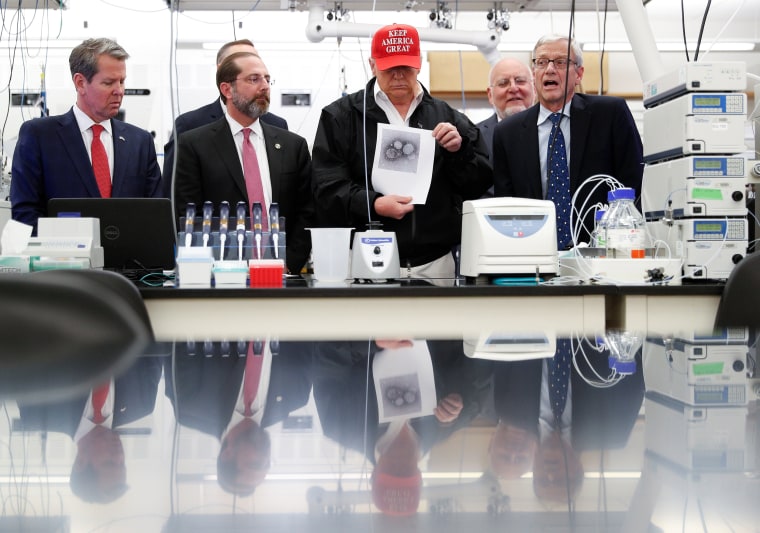Despite promising to be “so presidential, you will be so bored,” President Donald Trump has never realized that, because he holds the loudest microphone in the world, the American president must adjust his volume after he takes office because his words have outsize impact. Most presidents carefully think through their utterances; speechwriters help find the right words and ensure that they’re accurate.
Trump, however, still prefers to riff his way through the presidency, doing things like calling into Sean Hannity’s Fox News television show to discuss his “hunch” about the coronavirus death toll like “He’s ‘Donald from Queens,’” calling into local talk radio, as Jonathan Bernstein wrote at Bloomberg.
Under most circumstances, the negative effects of Trump’s normal, toxic mix of lies and narcissism would be diffuse because modern presidents — especially this one — are too polarizing and the public too divided. Whatever he says will automatically rally as much opposition as support, and as much disbelief as belief, making it difficult to markedly sway public opinion in his direction.
Want more articles like this? Sign up for the THINK newsletter to get updates on the week's most important cultural analysis
But the middle of the coronavirus crisis is one of the rare circumstances during which the presidential bully pulpit could really make a difference, thanks to a combination of a need for public education and reasoned calm. Trump fails in both aspects of that calculus. He has often been a font of dangerous nonsense, as he was Friday during his rambling and often misleading comments at the Centers for Disease Control and Prevention or the appearance where he seemed to believe that the novel coronavirus is just an exotic species of flu (it’s not).
And he has consistently downplayed the situation’s seriousness, mixing both nothing-to-see-here assurances aimed at pacifying the stock market and self-congratulation aimed at voters. For instance, “We’ve had tremendous success, tremendous success beyond what many people would’ve thought,” he said in a Feb. 26 press conference, asserting that the risk to Americans from the coronavirus was “very low.” Since then, the number of confirmed U.S. coronavirus cases has grown from 60 to more than 500 and the number of U.S. deaths has gone from zero to 22.
But Trump’s tune has not changed: “We have a perfectly coordinated and fine tuned plan at the White House for our attack on CoronaVirus,” he tweeted Sunday. (His Nero meme on Sunday and deaths-happen-but-life-goes-on tweet Monday did not improve matters. )
Meanwhile, the president has openly talked about keeping U.S. passengers on a cruise ship in coastal waters because “I like the numbers [of infections] where they are” and he didn’t want them to rise.
Optics, in other words, are more important to him than reality. But the coronavirus is not a marketing challenge on “The Apprentice”; it’s a fast-moving public health emergency. And while Trump long ago shredded whatever personal credibility he had with many Americans, his obsession with short-term perceptions particularly hampers the government’s ability to deal with the crisis. As the Center for Global Development’s Jeremy Konyndyk wrote Saturday, “When a president insists on claiming success irrespective of reality, it becomes much harder for those under him to acknowledge and correct mistakes.”
But doing so is classic Trump: He always has had a blinkered focus on “winning” the day’s news cycle, combined with an absolute unwillingness to admit error and an unflagging commitment to his own mendacious reality.
Still, he actually retains credibility with a committed subset of the public — his own supporters. A recent Reuters/Ipsos poll shows that Republicans are only half as likely as Democrats to see the coronavirus as an imminent threat. Trump risks sacrificing their health for his vainglory.
That Republicans and Democrats no longer believe the same set of facts is a long-standing trope but, in the context of the coronavirus, the trope can have deadly consequences. That prospect, though, hasn’t reined in Trump’s compulsions: He used one of his political rallies to claim that Democrats were politicizing the coronavirus. “This is their new hoax,” he said.
He later toured the CDC wearing a campaign hat and took time to blast Washington Gov. Jay Inslee, who is dealing with the most known infections, as “a snake,” because he had dared criticize the administration.
So much for the president speaking to and for the entire nation at a time of crisis. Calm confidence is surely important because public panic amplifies the disease’s destructive power, but so does relentless complacency and hewing to focus-tested narratives. If you listened only to Trump, you might think that anyone calling for precautions was a liberal operative, going to work while infected was not a big deal, tests are easily available (they’re not) and a vaccine is around the corner (try 12-18 months).
Donald Trump has never been good at the “bully pulpit” portion of the presidency, but it wasn’t until the onset of the coronavirus that his shortcoming became a public health hazard.
That’s because while the bully pulpit is largely misunderstood and not as effective a tool as popularly imagined, there are circumstances in which it really can serve an important function. But the very circumstances that make this a “bully pulpit moment” — the need for calm, reasoned leadership that can pull the country together and provide it with unbiased information to use to make smart decisions — are the circumstances in which he is mostly likely to be not simply feckless but aggressively hazardous.
Nero fiddled as Rome burned; now Trump golfs as America coughs its way into a pandemic.
Related:
• Trump's coronavirus response highlights why his White House is always in disarray
• Stopping the coronavirus requires health care access and paid sick leave. America's in trouble.
• Want to know how not to deal with coronavirus? Take a look at Hollywood pandemics





